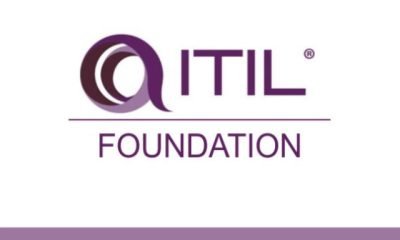Life Tips
How to Choose the Best Fixed-Blade Hunting Knives?


Have you decided to go hunting? It’s time to consider obtaining a hunting knife if you currently have a hunting tool that works for you.
Although it is safer to hold and easier to move in confined spaces, a short, sharp blade can cut just as well as a large one. You’ll be prepared for practically anything the outdoors may throw at you with a good fixed blade, including whittling, cutting, notching, butchering, filleting, and even spreading peanut butter.
Choosing the ideal hunting knife could be challenging due to the market’s abundance of possibilities.
Before going through the tips to find the best fixed-blade hunting knives, let’s understand their history.
The History of the Hunting Knife
A hunting knife is a vintage item that remains unmodified today. Bronze was used to make the first metal hunting knives during the Bronze Age, which began around 2000 BC. The usage of iron for the production of knives emerged with the onset of the Iron Age, which lasted from 1000 to 800 BC.
Iron allows for a sharper, more resilient cutting edge than bronze. Iron knives had a major flaw in that they were bent. By adding carbon to the iron, or “charring,” the Vikings were able to remedy it. It strengthened the iron blade’s rigidity and sharpness.
Tips on Choosing the Best Fixed-Blade Knife for Hunting Purpose
Here is the list of the factors to consider while choosing a fixed-blade knife for hunting.
1. Material
Knives with replaceable blades are frequently made of stainless steel, but knives with flip- or fixed blades are typically carbon steel. Choose based on your needs and preferences.
2. Sharpness
Sharp knives make clean, accurate cuts for capping, boning, or butchering games. Sharp knives also help remove more meat from the bone than dull ones since the former shreds and mangle the meat instead of cutting it precisely. Whatever knife and steel you decide on, you must maintain its sharpness by using a system with interchangeable blades or by honing your blade with sharpening sticks or stones.
3. Size, Grip and Weight
Your knife choice should be appropriate for your hand size and strength. It shouldn’t slip and should feel comfortable in your hand. Your hands will frequently become stained with blood while field-dressing animals, making the handles of some knives slippery. According to Cull, solid grips enable hunters to maintain control and prevent unintended cuts.
Arm ache or muscular exhaustion may result from holding a knife that is too heavy or has a bulky, uncomfortable grip. To ensure you find the right fit, compare knives with various sizes, handles, and weights.
4. Look for Durability
When looking for a knife, don’t forget to consider the handle. Wood, leather, and bone handles are practical and more beautiful. Synthetic handles with a nice balance of tight grip and affordability, such as Zytel, Kraton, and ABS, are great choices.
5. Clip or Carrying Case
The knife’s accessories are one last thing to think about before purchasing. Does it come with a carrying case or clip? These features make it simple and quick to get to your knife. If that isn’t crucial, you can place it in your pocket or backpack. If you want to purchase a hunting knife, be sure to take a carrying case into account.
“Most knives have a holster of some kind. “Even though it’s not required, it’s great, and it increases the worth of your purchase.”
Conclusion
More than anything, picking the right hunting knife depends on personal preference. By factoring the facts presented above into your decision-making process, you may be more confident that the knife you purchase is the greatest hunting knife for you and your needs.


Life Tips
Strategies for Reducing Expenses During Financial Hardships


In times of financial hardship, managing expenses becomes paramount. Whether due to unexpected job loss, medical expenses, or economic downturns, finding effective ways to cut costs can provide much-needed relief. By adopting thoughtful strategies and making well-informed decisions, individuals and families can weather the storm and regain control over their financial well-being.
Prioritize and Streamline Monthly Budgets
Assessing your monthly budget is the first step toward identifying areas where expenses can be reduced. Begin by categorizing essential expenses such as housing, groceries, and healthcare. Trim discretionary spending like eating out and entertainment. Seek opportunities to renegotiate bills, such as refinancing loans or consolidating debt for better interest rates. Evaluating subscriptions and memberships is also crucial. Small changes, like cooking at home or canceling unused services, can collectively make a significant impact.
Moreover, cultivating a frugal mindset can lead to lasting financial resilience. Regularly reviewing your budget empowers you to stay on track and make adjustments as needed. As you implement these strategies, remember that the journey toward financial stability is a gradual process that requires patience and perseverance. By conscientiously managing your expenses and embracing a more intentional lifestyle, you’ll not only overcome current challenges but also build a solid foundation for a more secure and prosperous future.
Efficient Energy Consumption: Best Practices for Lower Bills
Reducing utility bills is a key aspect of expense management. One effective way to achieve this is by ensuring your home is energy-efficient. Upgrade to LED lighting, seal any air leaks, and properly insulate your living space. When it comes to electricity, research and compare providers to find the best rates on electricity in your area. Many utility companies offer different plans, so take advantage of options that align with your usage patterns. Simple habits like turning off lights when not in use and unplugging electronics can also contribute to substantial savings.
Rethink Transportation and Commuting
Transportation costs can put a strain on any budget. If possible, consider using public transportation or carpooling to reduce fuel and maintenance expenses. For those with multiple vehicles, consider if downsizing to a single car could be a viable option. Alternatively, explore the potential of remote work arrangements or flexible schedules to cut down on commuting costs. Additionally, walking or cycling for short distances not only saves money but also promotes a healthier lifestyle.
Creative Shopping and Economical Lifestyle Choices
Shopping mindfully is essential when striving to reduce expenses. Before making purchases, compare prices across different retailers and explore sales, discounts, and loyalty programs. Consider buying in bulk for items with longer shelf lives. Embrace a minimalist mindset and declutter your living space—you may find items you no longer need that can be sold or repurposed. Additionally, explore affordable hobbies and recreational activities that don’t put a strain on your wallet. Engaging in free community events or enjoying the great outdoors can provide entertainment without breaking the bank.
In times of financial hardship, focusing on reducing your expenses can alleviate stress and provide a sense of control over your financial situation. By reevaluating and streamlining budgets, making energy-efficient choices, rethinking transportation, and adopting economical shopping habits, individuals can make meaningful strides toward financial stability. Every small change adds up, and with determination, thoughtful decisions, and a proactive mindset, it’s possible to weather any financial challenges and emerge stronger on the other side.
Life Tips
Tips for First-Time Home Buyers


Buying a home for the first time, whether on your own, with a partner, as a family, or maybe just as an investment is a landmark moment in your life.
It is an exciting time that is for sure, but it can also be pretty daunting because of the lengthy list of considerations to make.
Right now it is a particularly fraught time for first-time buyers due to the cost of living crisis, with interest rates at 4.5 per cent as of May 2023.
It makes for testing times when applying for mortgages, let alone the cost of solicitors, surveyors, new furniture, and utility bills to think about.
So, what is the current state of the housing market and what can you do to get yourselves on the property ladder?
State of the housing market
With inflation rates in the UK staying stubbornly above 10 per cent, it is not an easy to time to be buying.
The average house price in the UK right now is around £288,000, around £16,000 more than it was in February 2022.
Indeed, the increase in average house prices year on year from February 2022 to 2023 was 5.5 per cent, down from 6.5 per cent in January 2023.
A property purchase boom occurred in 2021 due to the temporary cut to stamp duty, though levels have now returned to roughly what they were pre-pandemic.
With demand for houses falling, the property market has cooled – so for sellers there is not a great incentive, making it even more difficult for first-time buyers.
Handy tips for first-time buyers
But do not be totally discouraged. There will always be a demand for buying houses, and there will always be a need to sell. The traditional reasons for selling up such as death, divorce and relocating for jobs will always exist.
First of all, look into existing schemes that can help you get on the ladder such as Help to Buy ISAs and Help to Buy Equity loans.
Next, make sure you have your finances figured out. How much do you have for your deposit? Some lenders will accept a five per cent deposit for instance. But then consider what furniture you will need, and what new utility bills you will have to purchase.
Talk to mortgage advisors about the different types; variable, fixed, cashback, offset. See which one works best for your personal situation and get several mortgage quotes.
Think also about the type of property you need, how many bedrooms, detached or semi-detached, and be willing to widen your search area as you might find cheaper alternatives to your first choice.
You will need a good solicitor and a reliable conveyancer. Solicitor fees will be around the £1,000 to £1,500 mark but having a competent solicitor will help when issues around purchasing arise.
Lastly, get your head around all the extra costs you are about to take on, and save, save, save. Do you need to have that takeaway or extra cup of chain-brand coffee? Making the smaller sacrifices in the short term will help with your long-term goals.
Life Tips
How to Best Secure a Home Purchase in 2023


Buying a home can be daunting, especially if you are a first-time buyer. You want to ensure you can secure a home purchase. The process can be overwhelming and stressful, but with the right approach and knowledge, you can secure a home purchase in 2023 without hassle. Follow these essential steps to make your home-buying experience smooth and successful.
Get pre-approved for a mortgage
Getting pre-approved for a mortgage should be one of the first steps in securing a home purchase. The pre-approval process involves a lender reviewing your financial information to determine how much money they can lend you to purchase a home.
You’ll need to provide your lender with documentation such as income statements, tax returns, and bank statements. The lender will then assess your financial situation and determine how much they are willing to lend you for a mortgage.
Pre-approval gives you an idea of what you can afford and puts you in a better position to negotiate with sellers. It will also show sellers that you are a serious buyer ready to make an offer.
Work with a reputable real estate agent
A reputable real estate agent can help you find the perfect home and guide you through the entire buying process. They have the knowledge and expertise to help you navigate the housing market, negotiate prices, and meet all legal requirements. Look for an agent with a proven track record of success and positive reviews from previous clients.
Notarizing documents
One often-overlooked step in the home-buying process is notarizing important documents. You’ll need to find a licensed real estate notary public in your area to notarize a document.
Some important documents you should notarize during the home-buying process include the purchase agreement, mortgage, and closing documents. Notarizing these documents will help stop fraud and ensure everyone knows their duties and responsibilities.
Consider the home inspection
Once you’ve found a home you’re interested in purchasing, hiring a home inspector is essential. A home inspector can assess the home’s condition and identify any potential issues or repairs that may need to be made. The inspection will give you peace of mind and help you avoid costly repairs down the line.
If any issues are identified, you can negotiate with the seller to have repairs made or ask for a reduction in the purchase price to cover the cost of repairs.
Be prepared for closing costs
Closing costs are fees associated with finalizing the purchase of a home. They typically include expenses such as title insurance, appraisal fees, and legal fees. Be prepared to pay these costs in addition to your down payment and monthly mortgage payments.
Ensure you understand these costs and factor them into your budget when making an offer on a home. You can also negotiate with the seller to have them cover some or all of the closing costs as part of the purchase agreement.
Before you go
Securing a home purchase in 2023 requires careful planning, patience, and the right team of professionals to guide you through the process. By notarizing important documents, getting pre-approved for a mortgage, working with a real estate professional, hiring a home inspector, and understanding your closing costs, you can ensure that your home purchase is secure and a sound investment for your future. Following the essential steps outlined in this article, you can make your home-buying experience smooth, successful, and stress-free.



 Health11 months ago
Health11 months ago6 Best Ways to Get Quality Sleep



 Social Media11 months ago
Social Media11 months agoLinda Yaccarino: Twitter’s New CEO from NBCUniversal



 Work11 months ago
Work11 months agoFive Things Employees Look for in a Job Role



 shopping12 months ago
shopping12 months agoEssential Tips for Buying Jewelry Online



 Tech12 months ago
Tech12 months agoWhat Are the Advantages of ITIL Foundation Certification for Organizations?



 Education9 months ago
Education9 months ago7 Tips for Writing Short Stories That Captivate and Resonate



 Entertainment11 months ago
Entertainment11 months ago5 Famous Gamblers and Their Most Memorable Quotes



 Business11 months ago
Business11 months agoHow to Design and Create a Poster from Scratch




















